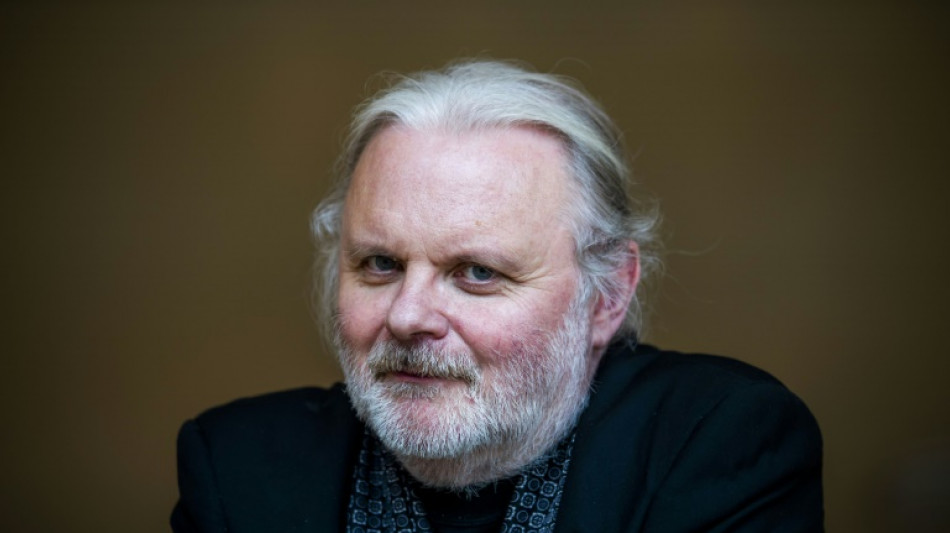
-
 Macron tells Xi he shares desire for 'durable peace' in Ukraine
Macron tells Xi he shares desire for 'durable peace' in Ukraine
-
Ruthless Japan beat China to move to brink of World Cup qualification

-
 French farmers threaten 'chaos' over proposed EU-Mercosur deal
French farmers threaten 'chaos' over proposed EU-Mercosur deal
-
Brazil arrests G20 guards over alleged 2022 Lula assassination plot

-
 China's Xi urges 'strategic' ties in talks with Germany's Scholz
China's Xi urges 'strategic' ties in talks with Germany's Scholz
-
Raducanu gives Britain lead on Slovakia in BJK Cup semis

-
 Russia says Ukraine fired first US-long range missiles
Russia says Ukraine fired first US-long range missiles
-
COP29 negotiators strive for deal after G20 'marching orders'

-
 Walmart lifts full-year forecast after strong Q3
Walmart lifts full-year forecast after strong Q3
-
British farmers protest in London over inheritance tax change

-
 NATO holds large Arctic exercises in Russia's backyard
NATO holds large Arctic exercises in Russia's backyard
-
Trouble brews in India's Manipur state

-
 Son of Norwegian princess arrested on suspicion of rape
Son of Norwegian princess arrested on suspicion of rape
-
Romanian court says 'irregularities' in influencer Andrew Tate's indictment

-
 Iran faces fresh censure over lack of cooperation at UN nuclear meeting
Iran faces fresh censure over lack of cooperation at UN nuclear meeting
-
Despondency and defiance as 45 Hong Kong campaigners jailed

-
 Scholar, lawmakers and journalist among Hong Kongers jailed
Scholar, lawmakers and journalist among Hong Kongers jailed
-
European stocks slide on fears of Russia-Ukraine escalation

-
 Police break up Georgia vote protest as president mounts court challenge
Police break up Georgia vote protest as president mounts court challenge
-
Spain royals visit flood epicentre after chaotic trip

-
 France's Gisele Pelicot says 'macho' society must change attitude on rape
France's Gisele Pelicot says 'macho' society must change attitude on rape
-
G20 leaders talk climate, wars -- and brace for Trump's return

-
 US lawmaker accuses Azerbaijan in near 'assault' at COP29
US lawmaker accuses Azerbaijan in near 'assault' at COP29
-
Tuchel's England have 'tools' to win World Cup, says Carsley

-
 Federer hails 'historic' Nadal ahead of imminent retirement
Federer hails 'historic' Nadal ahead of imminent retirement
-
Ukraine vows no surrender, Kremlin issues nuke threat on 1,000th day of war

-
 Novo Nordisk's obesity drug Wegovy goes on sale in China
Novo Nordisk's obesity drug Wegovy goes on sale in China
-
Spain royals to visit flood epicentre after chaotic trip: media

-
 French farmers step up protests against EU-Mercosur deal
French farmers step up protests against EU-Mercosur deal
-
Rose says Europe Ryder Cup stars play 'for the badge' not money

-
 Negotiators seek to break COP29 impasse after G20 'marching orders'
Negotiators seek to break COP29 impasse after G20 'marching orders'
-
Burst dike leaves Filipino farmers under water

-
 Markets rally after US bounce as Nvidia comes into focus
Markets rally after US bounce as Nvidia comes into focus
-
Crisis-hit Thyssenkrupp books another hefty annual loss

-
 US envoy in Lebanon for talks on halting Israel-Hezbollah war
US envoy in Lebanon for talks on halting Israel-Hezbollah war
-
India to send 5,000 extra troops to quell Manipur unrest

-
 Sex, drugs and gritty reality on Prague's underworld tours
Sex, drugs and gritty reality on Prague's underworld tours
-
Farmers descend on London to overturn inheritance tax change

-
 Clippers upset Warriors, Lillard saves Bucks
Clippers upset Warriors, Lillard saves Bucks
-
Acquitted 'Hong Kong 47' defendant sees freedom as responsibility

-
 Floods strike thousands of houses in northern Philippines
Floods strike thousands of houses in northern Philippines
-
Illegal farm fires fuel Indian capital's smog misery

-
 SpaceX set for Starship's next flight, Trump expected to attend
SpaceX set for Starship's next flight, Trump expected to attend
-
Texans cruise as Cowboys crisis deepens

-
 Do the Donald! Trump dance takes US sport by storm
Do the Donald! Trump dance takes US sport by storm
-
Home hero Cameron Smith desperate for first win of 2024 at Australian PGA

-
 Team Trump assails Biden decision on missiles for Ukraine
Team Trump assails Biden decision on missiles for Ukraine
-
Hong Kong court jails 45 democracy campaigners on subversion charges

-
 Several children injured in car crash at central China school
Several children injured in car crash at central China school
-
Urban mosquito sparks malaria surge in East Africa


Beckett to Pinter: Nobel-winning playwrights
Norway's Jon Fosse joins a select list of playwrights who have been awarded the Nobel Prize in Literature over the years.
Here are some of the best known:
- Harold Pinter (2005) -
British playwright and political campaigner Harold Pinter, master of the pregnant pause, won in 2005 for what the Swedish Academy called his ability to get at the truth "under everyday prattle".
His more than 30 plays dealt with domination and submission, threat and injustice and gave rise to the adjective "pinteresque" -- used to describe the sense of menace running through a work and those silences that speak volumes.
Never afraid to speak his mind, Pinter called US President George W. Bush a "mass murderer" and British Prime Minister Tony Blair a "deluded idiot" for invading Iraq.
- Dario Fo (1997) -
Italian playwright, director and performer Dario Fo skewered people in power in a series of satires that were staged worldwide, the best known of which are "Accidental Death of an Anarchist" and "Mistero Buffo" ("Comic Mystery").
The "Accidental Death of an Anarchist" was based on the case of an Italian railroad worker who mysteriously falls out of a Milan police station window while being falsely accused of terrorism.
"Mistero Buffo" was his one-man political telling of the Passion of the Christ, which the Vatican denounced as "the most blasphemous show in the history of television".
- Samuel Beckett (1969) -
The avant-garde Irish playwright produced one of the 20th century's most popular plays, "Waiting for Godot", in which as one dubious Irish critic memorably put it, "nothing happens, twice".
Born a minority Protestant in a stifling censorious Catholic Ireland, he fled to Paris in the 1930s where he remained for the rest of his life, writing in both English and French.
"Godot" is the existential tale of two bickering tramps who wait in vain for someone called Godot who never shows up.
Literary critics have long argued over who or what Godot actually represents, with interpretations ranging from God to death.
- Eugene O'Neill (1936) -
The father of modern American theatre brought the grim dramas of everyday life to stages whose staple had previously been vaudeville.
Murder, suicide and insanity were recurring themes in his work, which included the autobiographical "Long Day's Journey into Night" and "The Iceman Cometh".
In his Nobel acceptance speech, O'Neill hailed the prize as "a symbol of the recognition by Europe of the coming-of-age of the American theatre...worthy at last to claim kinship with the modern drama of Europe."
- Luigi Pirandello (1934) -
This Italian playwright was chased out of a Rome theatre a century ago when he staged his absurdist masterpiece "Six Characters in Search of an Author" (1921), in which a group of characters bursts into a rehearsal and share their story with the actors.
The inventor of the "play within a play" only began writing for the stage in his 40s.
Drawing inspiration from his wife's mental illness, he pondered the meaning of objective truth in philosophical works that blurred the lines between reality and performance.
- George Bernard Shaw (1925) -
The Irish-born playwright, intellectual and socialist activist is one of the few people to have won both an Oscar and a Nobel.
He baulked at accepting the Nobel, declaring "I can forgive (Alfred) Nobel for inventing dynamite, but only a fiend in human form could have invented the Nobel Prize," but later relented.
He struggled to get published for many years before starting to write for the stage.
His most famous play is "Pygmalion", which was turned into the wildly successful Broadway musical and film "My Fair Lady" for which Shaw won the Oscar for best screenplay.
A.Moore--AT



